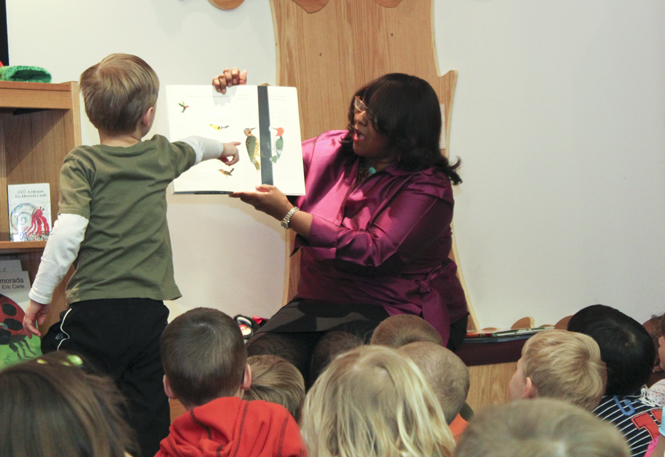Childhood Development Center becomes International Baccalaureate School
Iris Harvey, vice president for university relations, reads to children from the Child Development Center at the University Library on Thursday. Photo by Anthony Vence.
March 8, 2016
Transitioning into an International Baccalaureate (IB) school, the Kent State Child Development Center continues to offer a transdisciplinary approach to learning for young students.
“We are in the process of becoming an International Baccalaureate World School,” IB Coordinator Rochelle Hostler said. “We’re currently a candidate school. My job is to help us continue to work in ways that we already do, and also transition into using some of the IB framework in our everyday practice.”
Created in 1968 as a non-profit education foundation service, the International Baccalaureate, an international educational foundation, has grown to more than 4,000 schools. The curriculum foundation strives to develop innovative new ways of learning through research.
“We will follow what’s called the Primary Years Program,” Hostler said. “They have a certain curriculum framework. So we investigate and work with children in the ways that we always have which is through an inquiry approach and social constructivism. Then we use the framework and the components of it to engage in collaborative planning and make our work visible.”
“We always look at the population we serve,” Hostler said. “We try to create curriculum that’s meaningful within that context.”
As a laboratory school for the College of Education, Health and Human Services, the Child Development Center offers full and part day programs for kids who are 18 months old through kindergarten.
“It’s preschool primarily,” Children’s Program Director Pam Hutchins said. “We serve as a laboratory for the college in the sense that we host early childhood field students. Some of those college students complete their field experience here at the school.”
The Child Development Center also functions as a research center.
“We serve as a site for researchers who are interested in getting more knowledge about young children,” Hutchins said. “If you look around the school you’ll notice that it’s set up as a laboratory in the sense that there’s observation booths in each classroom.”
Research at the facility varies semester by semester. While teachers serve as mentors, they also help with some of the research.
“There is a life skills survey teachers just filled out as part of a research study,” Hutchins said. “Research varies. We also have a literacy test going on. It really just depends on what the interest level of the researcher is.”
At the Child Development Center, learning is not confined to the classroom. An outdoor learning lab offers young children the chance to ride bikes, play on climbers and explore dry river beds.
“There are a variety of experiences outdoors,” Hostler said. “We have a huge garden, sand exploration spots and a compost pile.”
“I like that they focus on childrens’ interest,” early childhood education major Katie Bellian said. “I think that it also provides a chance for college students to see if they really want to be education majors and become teachers by observing during their own classes.”
The Center offers children more freedom than a typical preschool, Bellian said.
“One of the basic tenets of our philosophy is this idea of play based curriculum, and how we really believe children learn through these experiences,” Hutchins said. “We really try to help our families and the community at large understand how those play based experience contribute to learning.”
Contact at Austin Farber at [email protected].












